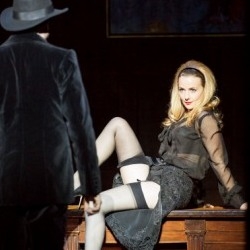Boulevard Solitude (WNO)
Two of the three ‘Fallen Women’ at the heart of WNO’s current season are brought to life by the Polish director Mariusz Trelinski, and the heroine of Boulevard Solitude shares designer Boris Cudlicka‘s bleak urban living-space with her Puccini counterpart, Manon Lescaut: the chrome railway-station, downmarket pick-up joint and soulless apartment where Puccini’s lovers play out their doomed relationship also play host to Henze’s Manon and Armand, whilst both ladies have a fondness for dark glasses and wheeled suitcases which underline their fundamental inscrutability and rootlessness.

© Johan Persson
It’s definitely the Henze opera that fares better from this arrangement. Boulevard Solitude works entirely on its own terms, whereas Manon Lescaut seemed rather hamstrung by the parallel and only really made sense when viewed through the lens of its twin.
Sarah Tynan was vocally and dramatically superb as Manon, physically fearless when required to play the tart and looking supermodel-fabulous in Marek Adamski's revealing costumes. As with Trelinski’s take on Puccini’s Manon, this is very much a tart without a heart: an approach which works far better with Henze’s acerbic score than it did with Puccini’s soaring heart-on-sleeve writing.
A decade after her sensational WNO debut in Katie Mitchell‘s Jephtha, Tynan’s voice retains every bit of its crystal clarity and agility (a prerequisite for Henze’s demanding writing here) but it’s gained a steadiness and focus that pay real dividends in this piece. The cool sensuality of her timbre and her ability to make blankness uncannily compelling made me long to see and hear her as Lulu: her voice is still perhaps on the light side for Berg’s femme fatale, but in the right house and with a sympathetic conductor she’d surely make a killing.
Jason Bridges fared well with the horribly demanding role of Armand, who descends to a narcotic hell like a coke-addled Orpheus, making the high-lying and often serialism-influenced lines seem almost consistently effortless.
Benjamin Bevan did much with the rather two-dimensional of Manon’s shady sleazebag of a brother, whilst British character-tenor par excellence Adrian Thompson turned in a masterly performance as Manon’s chief protector Monsieur Lilaque, treading the line between comic old buffer and something far darker with aplomb and singing with clarion tone.
Diction from everyone was impeccable throughout, even in the stratospheric realms to which Henze frequently despatches Manon, Armand and Lilaque: the fact that I’d forgotten my glasses and couldn’t see the surtitles mattered not a jot on this occasion!).
Henze’s score, previously unknown to me, is an absolute revelation. It plays fast and loose with the musical idioms of the mid-twentieth-century (neo-classicism and twelve-tone music nestle cheek-by-jowl with swing and blues elements), but the end result is so radically ahead of its time that I had to double-check that it was indeed premiered as long ago as 1952.
Certainly The Rake’s Progress, which debuted the previous year with a libretto by the same writers, haunts the score, but my initial sense was of Henze viewing Stravinsky from a significant chronological distance, and there are some passages which could almost be mistaken for Mark-Anthony Turnage.
The WNO band played their hearts out for Lothar Koenigs, who brought many of the strengths of his recent Lulu to bear on Henze’s gloriously eclectic score: the tacky cabaret elements, Bergian lyricism and big-band pastiches were all perfectly delineated and melded into a coherent whole.
A triumph, all in all – and, pleasing to report, a very well attended one, WNO are clearly doing a fine job of marketing the more challenging works in their repertoire, as their recent Jonathan Harvey production also testified. Is it too much to hope for a DVD?










